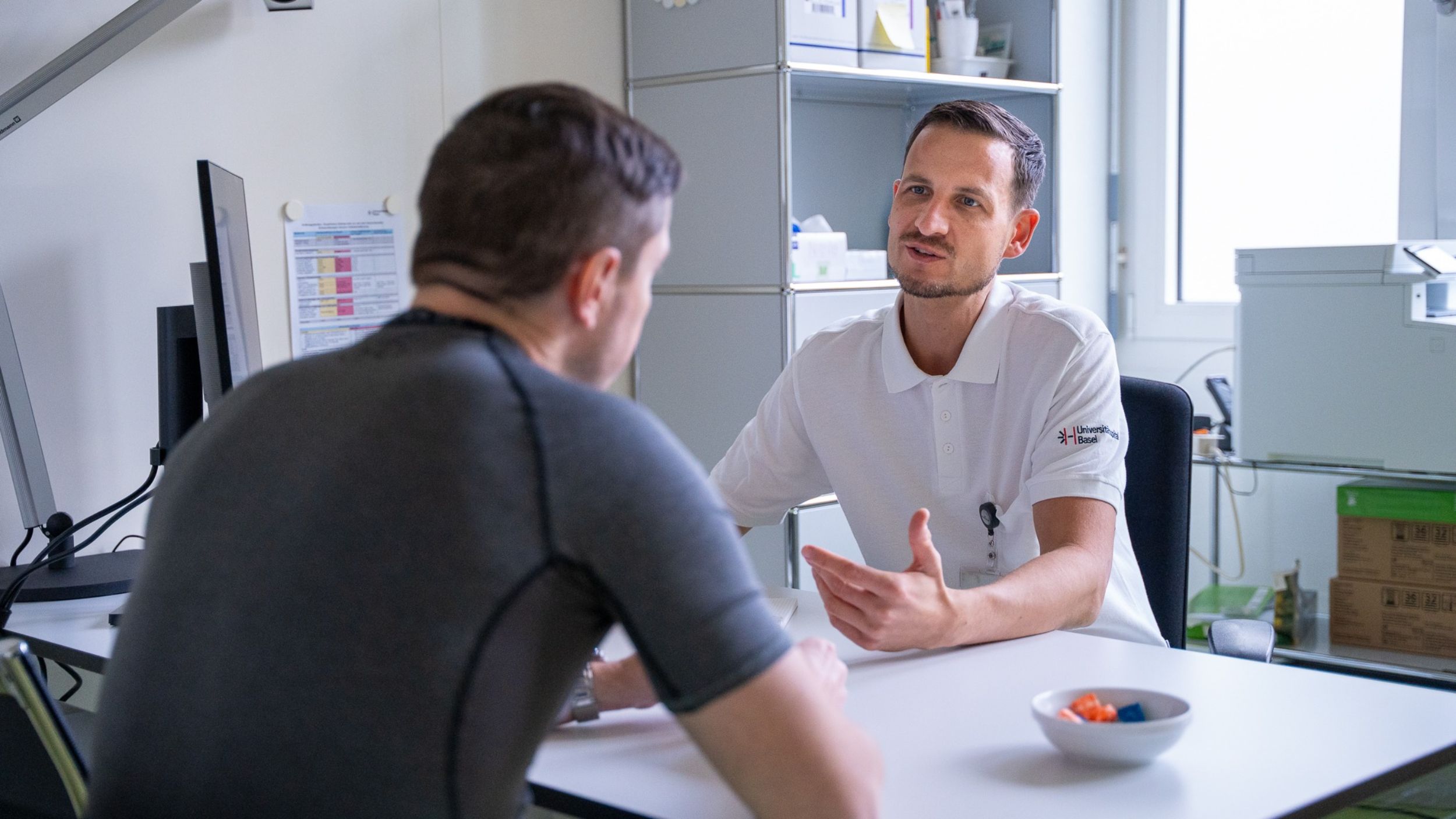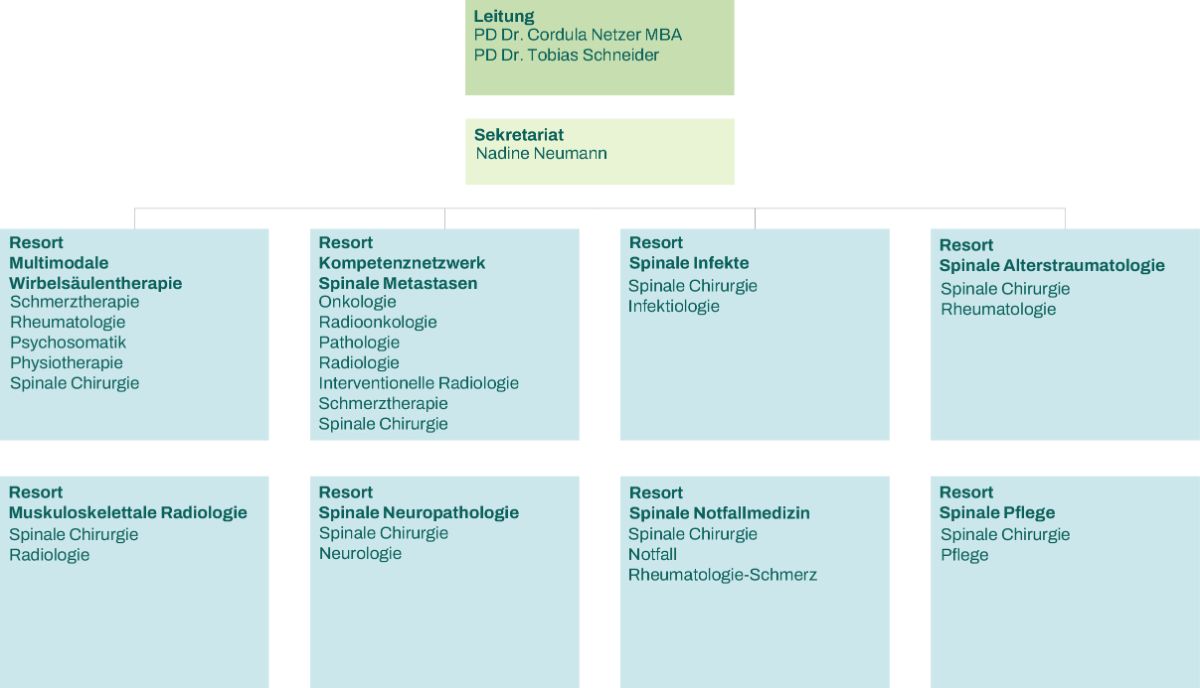
Range of services
Unser Wirbelsäulenzentrum steht für eine ganzheitliche und interdisziplinäre Versorgung, die Fachwissen, Kompetenz und patientenzentriertes Handeln in den Mittelpunkt stellt. Wir bieten Ihnen eine umfassende Betreuung auf höchstem Qualitätsniveau – von der Diagnostik bis zur individuellen Therapie.
Dank unseres eng vernetzten Teams können alle notwendigen Abklärungen koordiniert durchgeführt werden. So erhalten Sie eine präzise Diagnose und ein maßgeschneidertes Therapiekonzept, das genau auf Ihre Bedürfnisse abgestimmt ist.
Eine enge Zusammenarbeit sowie eine offene und transparente Kommunikation mit Ihnen und Ihren Hausärzt*innen sind für uns selbstverständlich. Unser Ziel ist es, Ihnen die bestmögliche Behandlung zu bieten und Ihre Lebensqualität nachhaltig zu verbessern.

Range of services
Wir untersuchen und behandeln Patient:innen mit akuten und chronischen Rückenschmerzen aller Art. Dank unserer Fachexpertise können wir jede Form von Rückenerkrankung beurteilen und Behandlungsempfehlungen aussprechen. Dazu gehören entzündliche (Rheuma/ Infekt), degenerative, durch Fehlstellung- oder Bildung (Deformitäten), durch Unfälle, Verletzungen (posttraumatische) oder durch Tumoren verursachte Wirbelsäulenerkrankungen.
Range of services
Operative Behandlung
Die Spinale Chirurgie am Universitätsspital Basel ist schweizweit die einzige universitäre Einrichtung, welche in einer einzigen Klinik alle operativen Behandlungen der Wirbelsäule anbietet. Das Spektrum umfasst degenerative Veränderungen (Bandscheibenprobleme, Spinalkanalstenosen, Wirbelgleiten), Deformitäten (Skoliosen), Verletzungen (Brüche auch mit Rückenmarksverletzungen), Tumoren (auch Rückenmarkstumoren und Metastasen), Knochenbrüche bei Osteoporose und die Behandlung von Entzündungen oder Infektionen der Wirbelsäule.
Die Klinik verfügt über modernste Operationstechniken. So haben wir in unserem Hybrid-Operationssaal eine Robotik, 3D-Bildgebung und Navigation. Mikrochirurgische und minimalinvasive Techniken gehören zu unserem Standard-Repertoire.
Für unsere Tumorpatientinnen und -patienten mit Osteoporose verwenden wir, wenn erforderlich, spezielle Implantate und Operationstechniken.
Spezialangebote ERASS (Enhanced Recovery after Spine Surgery)
Zielgruppe: Patienten die einer geplanten Operation im Bereich der Wirbelsäule bevorstehen
Vor einer geplanten Operation werden unsere Patient:innen auf Faktoren untersucht welche das Operationsrisiko erhöhen können. Patient:innen die in dieser Voruntersuchung auffallen, bieten eine erweiterte Abklärung an. Dabei werden Massnahmen erörtert, die eine Reduktion des Operations- Risikos herbeiführen können. Unser Ziel ist es die Versorgungsqualität und die Patientenzufriedenheit zu steigern und die Komplikationsrate, sowie stationäre Aufenthaltsdauer zu kürzen. Vor allem aber wollen wir eine realistische Erwartungshaltung an das Operationsergebnis generieren.
Nichtoperative Abklärung und Behandlung
Hier bieten wir der Patientin oder dem Patienten begleitend zur Operation oder alternativ sämtliche interventionellen Behandlungsmöglichkeiten an (Infiltrationen auch CT gesteuert), wie auch die Abklärung der Behandlungsmöglichkeit mit einem implantierter Stimulationssystem zur Schmerzlinderung am Rücken(-mark).
Basierend auf den Ergebnissen der interdisziplinären Abklärung werden der Patientin/dem Patienten verschiedene Therapien empfohlen. Zum Beispiel Trainingskonzept, begleitende Verhaltenstherapie, medikamentöse Schmerztherapie, Hilfsmittel wie sogenannte TENS-Geräte (das sind Geräte zur Elektrotherapie über die Haut).
Das Endergebnis von Abklärung und Behandlung werden mit der Patientin und dem Patienten und dem behandelnden Hausarzt ausführlich besprochen.
Rheumatologie, Neurologie und Infektiologie
Die Rheumatologie und die Neurologie sind regelmässig in den Abklärungsprozess involviert. Bei Bedarf auch die Infektiologie. Es geht dabei um die Identifizierung von Begleiterkrankungen, welche durch eine gezielte Behandlung noch zusätzlich adressiert werden sollten oder gar müssen.
Schmerztherapeutische und Psychosomatische Abklärung
Wir bieten ein Assessment, wo neben der Auswirkung Ihrer Rückenbeschwerden auf Ihren Alltag auch Ihre psychische Verfassung genauestens erfasst und analysiert wird. Mechanismen der Schmerzverarbeitung werden differenziert betrachtet. Dies sind wichtige Bausteine des Therapiekonzeptes.
Physiotherapeutisches Assessment
Wir bieten ein Assessment, wo neben der Auswirkung Ihrer Rückenbeschwerden auf Ihren Alltag auch Ihre körperliche Verfassung genauestens erfasst und analysiert wird. Dies ist ein wichtiger Baustein des Therapiekonzeptes.
Bildgebende Verfahren der Wirbelsäule
Wir verfügten über modernste Techniken in der Bildgebung. Und können so von der Ganzkörpervermessung bis hin zu Funktionsuntersuchungen der Wirbelsäule sämtliche Veränderungen erfassen, welche sich auf Ihre Wirbelsäule auswirken. Neben den Standardverfahren für Knochendichtemessung, Röntgen, MRI und CT haben wir auch Expertise in der Darstellung entzündlicher und tumorbedingter Wirbelsäulenveränderungen. Darüber hinaus verfügen wir über spezielle Protokolle zur Beurteilung der Rückenmuskulatur.
Spezialangebote Komplexe Abklärung
Zielgruppe: Patienten mit einer komplexen Vorgeschichte oder komplexen Umständen, welche voraussichtlich nicht von einer Operation profitieren.
Im Rahmen der komplexen Abklärung werden Patient:innen in einem 3-tägigen stationären Aufenthalt von unseren Fachexperten analysiert. Am Ende der 3 Tage findet eine eingehende Diskussion und Konsensfindung durch die Fachexperten statt. In einem gemeinsamem Abschlussgespräch mit dem Patienten werden mögliche weitere Abklärungen und/oder ein Therapiekonzept vorgeschlagen.
Zu berücksichtigen ist, dass der 3-tägige Aufenthalt keine Behandlung/ Therapie beinhaltet, sondern rein diagnostisch, also zur Ausarbeitung eines nachhaltigen Behandlungskonzeptes dient.
Behandlung von Patienten mit Wirbelsäulenmetastasen
Das Kompetenznetzwerk bildet für Patient:innen mit Wirbelsäulenmetastasen und Arzt:innen mit entsprechenden Patienten eine erste Anlaufstelle.
Wir geben Hilfestellung für die weitere Abklärung und stellen Abklärungs- und Behandlungsalgorithmen, an deren Ausarbeitung wir in nationalen und internationalen Expertengremien mitgewirkt haben, zur Verfügung.
Unsere Schwerpunkte liegen sowohl in der chirurgischen als auch nicht-chirurgischen Behandlung bei jeder Form von Wirbelsäulenmetastasen. Wir arbeiten eng mit den niedergelassenen Kollegen aber auch Fachexperten in anderen Spitälern zusammen.
Sie erreichen uns unter spinaletumore@usb.ch
Resorts
Die Resorts stellen Arbeitsgruppen dar, welche sich aus Experten der 17 Fachdisziplinen zusammensetzen. Unsere Experten sind durch ihre Expertise und Mitgliedschaft in nationalen und internationalen Fachgesellschaften immer auf dem neuesten Wissensstand. So gewährleisten wir für unsere Patient:innen die bestmöglich Versorgungsqualität. Durch eigene Forschungsprojekte und Ausarbeitung von Abklärungs- und Behandlungsstandards (SOP`s Standard Operating Procederes) können wir gewährleisten, dass unsere Patienten auf allerhöchstem Niveau versorgt werden.

- Multimodale Wirbelsäulentherapie
- Kompetenznetzwerk Spinale Metastasen
- Spinale Notfallmedizin
- Spinale Alterstraumatologie
- Spinale Infekte
- Spinale Neuropathologien
- Spinale Pflege
- Spinale Bildgebung
Spezialangebote
- Komplexe Abklärung bei komplizierten Rückenbeschwerden
- ERASS (Enhanced Recovery after Spine Surgery) Konzept zur Reduktion des Operationsrisikos vor geplanten Operationen
- Interdisziplinäre Schmerzbehandlung mit Rücken (-marks) Stimulation
- Interdisziplinäre Tumorschmerzbehandlung
Direkte Kontaktaufnahme für Fragen bei Patienten mit Wirbelsäulenmetastasen unter spinaletumore@usb.ch
